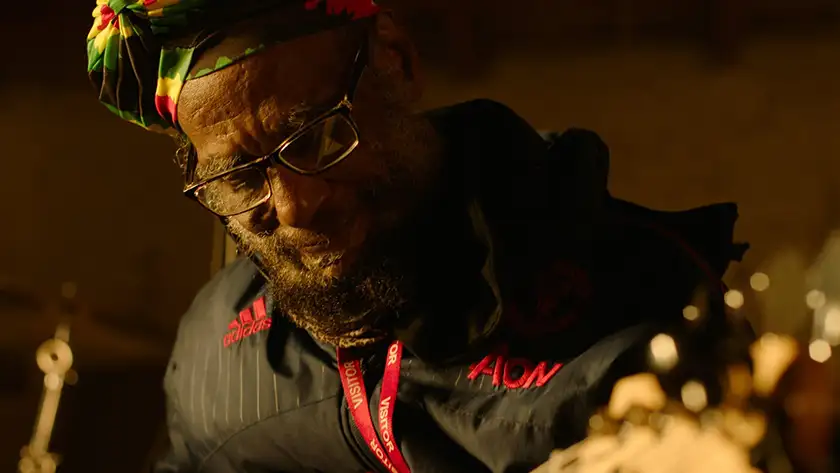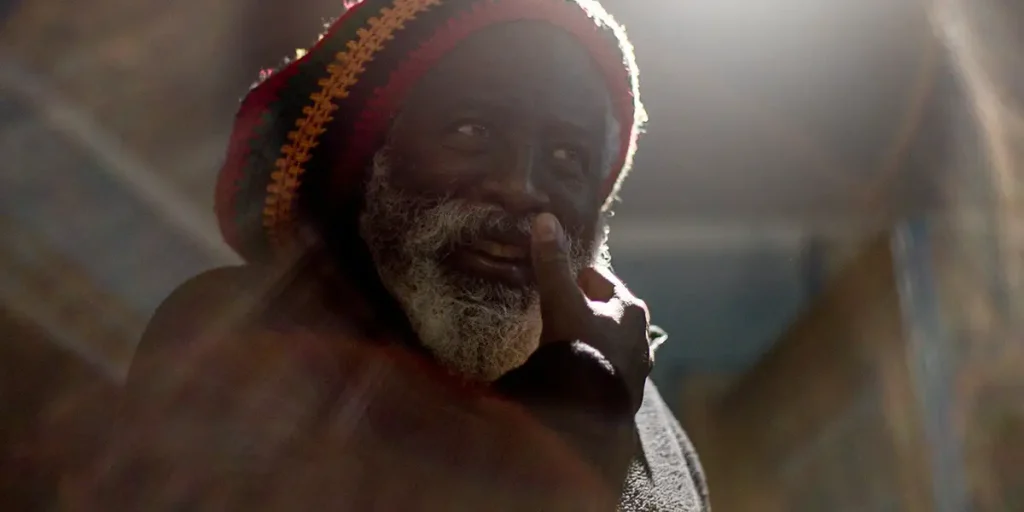Harder Than The Rock explores the paradox of overlooked genius and, for its strengths and flaws, will leave you enlightened and appreciative of humble, committed artists.
Director: Mark Warmington
Genre: Documentary
Run Time: 100′
U.K. Release: October 1, 2024 (limited, theatrical)
U.K. Release: 2025 (TBA)
You’ve never heard of them. If you search for them on Apple Music, their name doesn’t auto-populate as a suggestion, and even if it did, you wouldn’t be quite sure if you were spelling it correctly anyways. If you somehow make it to their artist page, there’s no banner photo, only the squared crops of album covers dating decades past.
Their music is simple, their marketing shoddy, and their public profile nearly non-existent. They are the Cimarons, and they are one of the most important bands of the 20th century.
This is the intriguing premise behind director Mark Warmington’s 2024 documentary Harder Than The Rock, an official selection for Sheffield DocFest, the U.K.’s largest annual documentary film festival. It fittingly arrives in a year where, amidst all sorts of social upheaval, the movie world has taken a keen interest in how stories of music shape our responses to culture, with Bob Marley: One Love and A Complete Unknown standing out as examples.
This paradoxical and prophetic power of music is certainly at the forefront of Warmington’s work here, staring with unflinching vision at the way things are and dreaming with hope towards the way they ought to be. The Cimarons were profoundly influential, yet their career was cut short and much of their early work missed due to a lack of media and marketing around them. They and their music carried with them a profound sense of peace, yet they wrote and sang about their tumultuous and trauma-riddled cultural histories. Their lyrics were precise and personal, and yet resonated in remarkable ways to the oppressed and downtrodden, explored compellingly in their appeal to Irish youth during The Troubles – a perfect encapsulation of James Joyce’s notion that “In the particular is contained the universal.”
All of this is explored by starting at the beginning: Warmington transports the audience back to the 1950s and 60s in the U.K., cutting between faded photos and contemporary reflective interviews, and tracing the rise of a rag tag group of Jamaican immigrant teenagers bonding over their shared love of sound. The retrospective works well in spurts: while there are some compelling transporting moments and photos of the early Cimarons, many shots presented as flashbacks also look and feel like generic stock footage, and so take away from the personal nature of the account at points.

This is more than made up for in the middle third of the film, where things really sing, literally and figuratively. The organic connection of the bandmates is traced from jam sessions to songwriting, songwriting to performing, performing to touring, and touring to studio support for some of the most noteworthy bands and albums of their day. Along the way, they become pioneers of a new, up and coming genre, uniquely Jamaican in flavor and theme: reggae. Becoming the “first” in a whole host of categories, The Cimarons–pulling their name, which means “wild” or “untamed,” from the title of an old American Western T.V. show–encapsulate the spirit of reggae in a way that would influence artists for years to come, their simple and infectious drum and bass melodies carrying along politically subversive, socially resonant, and spiritually explorative themes. Their work is akin to what the Rolling Stones did for rock ‘n’ roll, one interviewee says.
Indeed, the interviewing work Warmington does here stands out as a strength. He effectively captures a diversity of voices (British, Irish, Jamaican, and more) who all attest to the decades-long power and influence of this seemingly unknown band, leaving the audience in a constant state of surprise and bewilderment. “How have I never heard of them?” I found myself asking; “Why isn’t their work more famous?” The film also makes an effective choice to cut back and forth in its storytelling between a contemporary performance of the band replaying their hits with the records, interviews, articles that traced their rise decades prior. This implicitly invites the audience into the fundamental humanity of these musicians: you can see their years of passion pouring forth in joyful exuberance as you hear their stories being told to you through the music, a palpable visual and audible connection of past with present.
Overcoming some of its early, generic image making, the story moves from factual reclamation to intimate exploration in these moments, evolving from reading an encyclopedia entry to sitting down with someone to hear them tell–or sing–their history. “Music can carry you,” one band member states. The movie makes this self-evident, revealing that–through gain and loss, unity and racism, joy and sorrow–music has a life-sustaining power. They never played for the fame or the notoriety: they played because they could do nothing else. They played because the music is what matters, and that’s why they still play.
It’s that sentiment that clearly drove the creative choice to centralize extended musical performances throughout. Numerous songs are filmed and presented without interruption, centralizing the music over other possible stylistic or storytelling choices. This works particularly well in the case of the Cimaron story, not only because you get to see their creativity and musicianship on full display, but because it leaves a lasting artifact of an otherwise overlooked and lost band. For a movie explicitly helping expose the public to an overlooked part of music history, its choice to centralize the music and let it tell the story is a wise and effective one.
While the film did get a bit lost in its narrative sauce towards the end, functionally telling three quite different, tonally jarring endings, Harder Than The Rock succeeds far more than it fails. If you’ve never heard of The Cimarons, this one will ensure that you hear them and hear from them in spades, and you’ll be the better for it.
Harder Than The Rock: Movie Plot & Recap
Synopsis:
Harder Than The Rock spotlights the overlooked and paradoxical legacy of The Cimarons, reggae pioneers whose profound influence, resilience, and music shaped decades of cultural and social history.
Pros:
- Musically infectious
- Historically enlightening
Cons:
- Drags in the final third
- Hurt by the lack of historical record of its own subject
Harder Than The Rock had a limited theatrical release in the UK on October 1, 2024. The film will be released in the US and internationally from 2025.

